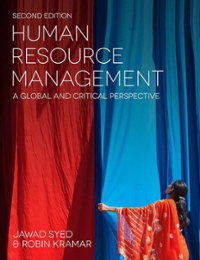It was another hot, humid and smoggy day in Beijing, and Aliling was waiting for the company
Question:
It was another hot, humid and smoggy day in Beijing, and Aliling was waiting for the company shuttle bus to go to work. She had stopped hoping for better weather at least three weeks ago. Ailing was a 42-year-old Chinese woman with a teenage son, and she had been working in a state-owned multinational energy company for more than 14 years. Her husband also worked in the same company, and he had been working as an expatriate in Sudan over the last five years. Before moving to the human resource (HR) department, Aling had worked in the marketing department and was responsible for public relations. Her main responsibility was to act as a consultant in communication matters. Due to restructuring activities in the company, Aliling had been assigned to the HR team as a manager five years ago. She had a bachelor's degree in business management. She was also doing an MBA degree in human resource management in one of the top universities in Beijing during weekends, in order to keep her knowledge up to date. The new task of the HR team was to update the work-life balance (WLB) system throughout the organisation in China.
It was not only the weather that got to Ailing but also the fact that many things would be changing within the HR department in the next few months. She did not have time to sit in the employee canteen and to enjoy the free breakfast buffet provided by the company. She ordered an egg sandwich and a cup of green tea for take-away and quickly finished her breakfast while going through all her work emails.
The main purposes of creating and establishing a WLB system were to develop and promote a healthy working environment, as well as positive employee relations. Aling and her team members had been working on the system over the past two years. By learning from other Western multinational competitors, Aling's company had also developed various programmes to support total quality of life for their employees. For example, apart from providing free company shuttle bus and free meals at their staff canteen, the company also rented a fully equipped sport centre every Sunday morning. All employees, as well as two of their family members could access all the facilities at that time. Moreover, vouchers for cinemas and bookshops were also generously provided for employees every six months.
Ironically, Ailing, the HR manager who developed these programmes, was too busy to take advantage of all these wellness benefits herself. The only programme she could benefit from was the tuition and education support, as her MBA study was fully reimbursed by the company. In addition, since her husband worked as an expatriate, their son's tuition fee for a private bilingual boarding school had also been partially paid by the company. Ailing and her husband were planning to send their son to study in the USA for his Bachelor's and Master's degrees, and both of them had to work hard in order to have enough put aside. Although the company would also reimburse the fees of higher education for their son, the living expenses in the United States were still much higher than in Beijing.
Ailing's son could only come home during weekends, when she had to attend lectures in the university. The only periods Ailing could spend with her son were Friday and Saturday evenings, then she had to drive him back to the school which was outside the city every Sunday afternoon. Due to the time difference, she was only able to have short video chats with her husband in the evenings while he was taking his lunch breaks in Sudan. She couldn't help feeling guilty, though, for missing out on her son's and husband's everyday lives. Ailing herself, always felt stressed and frustrated, as she had few people to talk to. She loved her job, she knew she was really good at it, and she prided herself in being known as professional and reliable. She wanted to progress further within her organisation but constantly felt guilty about not spending enough time with her family. Her husband often said he felt the same way but this was the way it had to be if they wanted to provide the best for them and their son.
A new email just popped into her computer screen. It was about the gaia dinner next Friday night for the middle and senior managers in the company. She really didn't have the energy to attend, and it would be one of the few nights she could spend with her son. In addition, as a Muslim woman, Ailing did not feel very comfortable when there was alcohol around, and at these functions people tended to drink a lot. Most of her colleagues were aware of Ailing's religion, but she always felt they wouldn't be willing to change their habits just because she was there. This was also a key reason Ailing did not normally eat in the staff canteen, as there was no halal food and only a few vegetarian options. Despite all these thoughts in her mind, she still accepted the invitation to the gala dinner. She didn't want to be perceived as an outsider.
Questions
1 What are the main issues Ailing is facing at work and at home?
2 Do you think Ailing is receiving enough support from her company?
3 How could she better balance her work and personal life demands?
4 Could the nature of her job have an impact on Ailing's relationship with her husband and son? In what ways?
5 Could there be any cultural/religious elements that readers need to be sensitive to when offering their suggestions?
Step by Step Answer:

Human Resource Management A Global And Critical Perspective
ISBN: 9781137521620
2nd Edition
Authors: Jawad Syed, J; Kramar Syed, Robin Kramar





